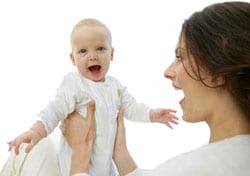Skills such as taking a first step, smiling for the first time, and waving “bye bye” are called developmental milestones. Children reach milestones in how they play, learn, speak, act, and move (crawling, walking, etc.).
Download the milestone checklists 2 Months to 5 years
6 Months

How your child plays, learns, speaks, acts, and moves offers important clues about your child’s development. Developmental milestones are things most children can do by a certain age.
Check the milestones your child has reached by the end of 6 months. Take this with you and talk with your child’s doctor at every visit about the milestones your child has reached and what to expect next.
What most babies do by this age:
Social and Emotional
- Knows familiar faces and begins to know if someone is a stranger
- Likes to play with others, especially parents
- Responds to other people’s emotions and often seems happy
- Likes to look at self in a mirror
Language/Communication
- Responds to sounds by making sounds
- Strings vowels together when babbling (“ah,” “eh,” “oh”) and likes taking turns with parent while making sounds
- Responds to own name
- Makes sounds to show joy and displeasure
- Begins to say consonant sounds (jabbering with “m,” “b”)

Cognitive (learning, thinking, problem-solving)
- Looks around at things nearby
- Brings things to mouth
- Shows curiosity about things and tries to get things that are out of reach
- Begins to pass things from one hand to the other
Movement/Physical Development
- Rolls over in both directions (front to back, back to front)
- Begins to sit without support
- When standing, supports weight on legs and might bounce
- Rocks back and forth, sometimes crawling backward before moving forward
No comments:
Post a Comment